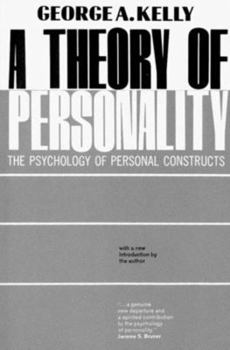A Theory of Personality: The Psychology of Personal Constructs
Select Format
Select Condition 
Book Overview
This original theory of personality is based on the concept that there are many workable ways by which individuals can construct their world. George Kelly's starting point and basic premise is that people's processes are psychologically channeled by the ways they anticipate events rather than by the ways they react to them. We develop new means of overcoming obstacles; we are, therefore, neither prisoners of our environment nor victims of our past.
In Dr. Kelly's groundbreaking theory, the patterns of our make-up, which he calls constructs, are the key to changing old patters. Each person anticipates events differently, and Dr. Kelly shows how we can begin to understand each person's unique constructs. In this way, a person is enabled to create alternative constructions--finding a sense of meaning in life, regaining control over his or her environment, and establishing new roads to mental health. This volume consists of the first three chapters of Kelly's two-volume work The Psychology of Personal Constructs.
In Dr. Kelly's groundbreaking theory, the patterns of our make-up, which he calls constructs, are the key to changing old patters. Each person anticipates events differently, and Dr. Kelly shows how we can begin to understand each person's unique constructs. In this way, a person is enabled to create alternative constructions--finding a sense of meaning in life, regaining control over his or her environment, and establishing new roads to mental health. This volume consists of the first three chapters of Kelly's two-volume work The Psychology of Personal Constructs.
Format:Paperback
Language:English
ISBN:0393001520
ISBN13:9780393001525
Release Date:May 1963
Publisher:W. W. Norton & Company
Length:202 Pages
Weight:0.49 lbs.
Dimensions:0.5" x 5.2" x 7.7"
Customer Reviews
4 ratings
A Little Biased Reviewer - But Great Theory!
Published by Thriftbooks.com User , 17 years ago
Yes, I must admit it, I am a bit biased. George Kelly is my intellectual great-grandfather. That is, I trace my intellectual heritage through my mentor, Brent D. Slife, through his mentor, Joseph F. Rychlak, to his mentor, George A. Kelly. As such, I am quite biased in this review of Kelly's book on Personal Construct Psychology. That being said, I still believe that this is an excellent book. Kelly provides a wonderfully divergent perspective on personality from the more Lockean perspectives that have prevailed in psychological theorizing. Kelly is quite thoughtful and presents a very thorough, well conceived theory that attempts to address, in a rationalistic, telic perspective the personality of human beings. Still, as a truly new theory, Kelly introduces new terms that may be difficult for some to understand initially. Furthermore, as a new theory, which reintroduces final causal theorizing, which conceives of humans as being determined by their goals, purposes, and ends (instead of linear, deterministic theorizing that conceives of humans as determined by their past), while refreshing and, from my perspective, essential for psychology, it may be difficulty to integrate this theory into their already generated linear conceptualizations. I recommend you read this with an open mind and attempt to think more freely from this divergent perspective offered by Kelly.
Constructive Alternativism
Published by Thriftbooks.com User , 24 years ago
Kelly's personality theory is based on an underlying philosophical position which he called "constructive alternativism" (3). According to this view, "We assume that all of our present interpretations of the universe are subject to revision or replacement" (15). Kelly focused on "man-the-scientist" (4): "Might not the individual man, each in his own personal way, assume more of the stature of a scientist, ever seeking to predict and control the course of events with which he is involved?" (5). The "Fundamental Postulate" of his theory states "A person's processes are psychologically channelized by the ways in which he anticipates events" (46). This occurs as a person construes or interprets, evaluates, makes sense of, observed regularities in what is going on by noting similarities and differences among events. Thus an organized system of constructs is built up, significantly embodied in language, that provides a basis for prediction and control. Problems may result from the limitations in a person's system of constructs, combined with resistance to changing them. Kelly's approach is presented as a series of postulates and corollaries. Although presented somewhat technically and at a high order of abstraction, he writes clearly and sometimes memorably. For example, noting the theme of his book he writes, "...man, to the extent that he is able to construe his circumstances, can find for himself freedom from their domination. It implies also that man can enslave himself with his own ideas and then win his freedom again by reconstruing his life" (21). Kelly wrote at a time before concern with non-sexist terminology was formulated and can be forgiven for his lapses in this regard. The resonance of his formulations with those of Korzybski and Whorf seems remarkable and provides an example of the inter-theory corroboration that Korzybski found so valuable.
Excellent discription of a labeling theory.
Published by Thriftbooks.com User , 26 years ago
This book provides an interesting theory of the mind via labels (constructs). His notion of dilating our perceptual field, which leads one to better psychological health, has led me to dig deeper into my own mind. It has also allow me to begin to develope my own theory of the mind. Thanks George
Good One
Published by Thriftbooks.com User , 26 years ago
I like the way this book explains constructs





